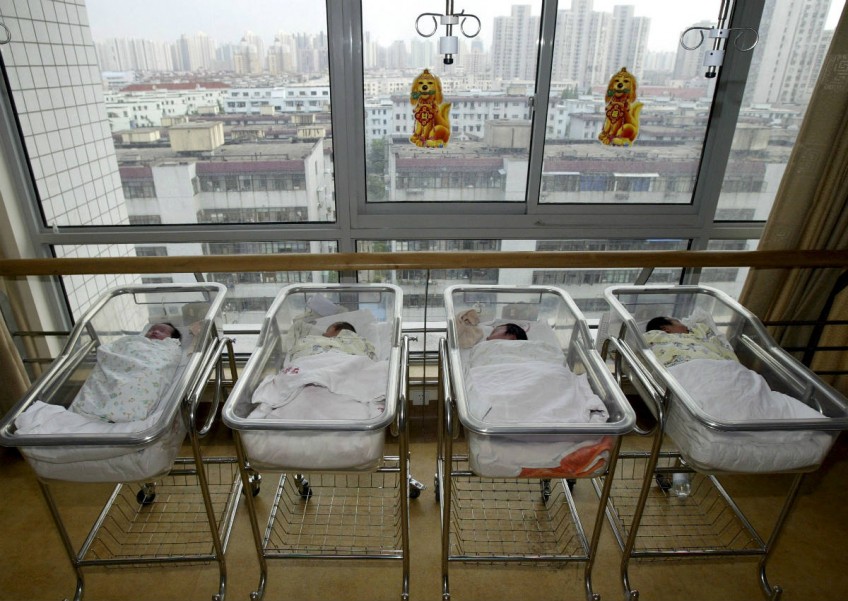China in shock: Why no baby boom?

Number of births, working-age people and migrants shrank last year
Already suffering its slowest growth in 25 years, China's economy has been dealt another blow after the latest population data suggested the problem could worsen.
Last year, the number of births fell, its working-age population suffered a record decline, and its migrant population shrank for the first time in 30 years, according to data released by the National Bureau of Statistics (NBS) on Tuesday.
Experts are warning that these trends could further put the brakes on China's economy, with labour being a key component of growth.
One of the most surprising figures was the drop in the number of births, which confounded predictions that a relaxed family planning policy would boost its ageing population and shrinking workforce.
"A slowing economy could have reduced a parent's desire to have children, given the cost involved," Nankai University population expert Yuan Xin told The Straits Times.
Some 16.55 million babies were born last year, down from 16.87 million in 2014. This comes as China's working-age population, or those between 16 and 60 years old, saw a record decline amid gloomy forecasts of its economy.
The NBS said the working-age population fell by 4.87 million last year, sharper than the 3.71 million decline recorded in 2014.
The workforce of China, which has 1.37 billion people, now stands at 911 million.
Since it first began shrinking in 2012, the working-age population has fallen by some 13 million, or more than double Singapore's population.
China's migrant population also dropped by 5.68 million to 247 million, meaning that fewer were going to the cities to look for work.
Economist Li Xunlei told the official Xinhua news agency that the working-age population decline will hit consumption, given that this group of people formed the bulk of consumers.
The latest figures have raised questions about the effectiveness of government policies. In particular, the authorities had believed that allowing people to have more children would reverse the country's slowing birth rates.
China last year abolished its controversial one-child policy, which had been in place for more than three decades.
The two-child policy, which kicked in nationwide on Jan 1, is expected to add three million babies a year over the next five years, family planning officials had said.
But if the latest figures are anything to go by, that estimate appears overly optimistic.
Experts had predicted that one million more babies would be born last year, compared to 2014, due to a partial relaxation of the one-child policy in 2013 that allowed couples to have a second child if either parent was an only child. But instead of hitting the predicted 18 million births, the number of newborns dropped by 320,000 last year.
Prof Yuan believes that demographers may have been caught out by the low birth rate among those who applied to have a second child.
He pointed out that while 1.9 million families applied for the 2013 scheme, less than one-third actually conceived a second child.
"The younger mothers might have applied for it and - since time is on their side - just decided to wait," he said.
Chinese men also outnumbered women by 33.6 million last year, according to NBS figures.
With 113.5 boys to every 100 girls born, the authorities are concerned about "leftover men" and the difficulties they face in finding a wife.
An online commentary published by respected Caixin financial news magazine yesterday urged the authorities to do away with family planning completely, arguing that the current population growth estimates appear "too optimistic".
"Faced with the severe crisis of low birth rates, we need to immediately cancel restrictions, to quickly encourage childbirth... We believe this is China's biggest challenge in the future," it wrote.
chengwee@sph.com.sg

This article was first published on JAN 21, 2016.
Get a copy of The Straits Times or go to straitstimes.com for more stories.
The latest figures have raised questions about the effectiveness of government policies. In particular, the authorities had believed that allowing people to have more children would reverse the country's slowing birth rates.